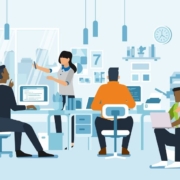Decision-Making Myths – Debunked
Decision-making is not fortune-telling, and good decisions do not always result in predictable outcomes.
Can you imagine life without your smartphone? So many of us can’t. We depend upon them for everything from directions to telling us the temperature outside to tracking our daily steps and heart rate. Our “Hey, Siri” culture has conditioned us to equate speed with efficiency and efficacy — and it’s changing how we process information. Our brains have become conditioned to respond with pleasure to the bings, pings, and dings our phones and computers provide.
While Siri and Alexa and Google are great when we’re jonesing for Italian food and want help finding a restaurant, they’re not great, or even desirable, when it comes to complex decision-making. In fact, they help enable a series of counterproductive ideas and reactive behaviors that actually impair your ability to make informed decisions. For example, let’s say you want to buy a car. Maybe you’re weighing a Prius versus a Crosstrek. Siri and Google can give you all sorts of information, such as fuel efficiency or the current interest rate on your loan. But a search engine won’t know why you’re buying the car, how you intend to use it, or what impact the purchase will have on your budget. Ultimately your decision needs to come from a clear understanding of your needs, values, and goals — information that’s outside the reach of their algorithms.
The most important things you need to learn often aren’t formally taught when you’re young. For example, many lament that teenagers aren’t educated on how to manage money. It’s a fair criticism. Evidence suggests a severe lack of knowledge around basic personal finance; a 2018 survey found that less than 50 percent of respondents could correctly define what interest is, the concept of bankruptcy, or how inflation works. In the absence of knowledge, myths creep in. One example that gets attention this time of year is the “benefit” of receiving a tax refund. This is a myth. In almost all cases, receiving a substantial refund isn’t a good thing. After all, you lent the government money—interest-free— throughout the year.
Another myth: All college degrees are a sound financial decision. Data suggests that some people spend way too much money on a degree that won’t land them a job with a salary sufficient enough to make the investment worthwhile. It’s part of the reason why there’s a student debt crisis. Like personal finance, management isn’t something most people study formally—although HBS Online offers a Management Essentials course. Most people learn management “on the job,” and in fits and starts. As with personal finance, myths often develop for those who’ve never received management training.
On January 15th 2009 the world witnessed an unusual incident. The press called it ‘Miracle on the Hudson’. On that unforgetable day, an Airbus A320 aircraft with 150 passengers and crew members on board, encountered multiple bird strikes. They damaged the turbofan engines to the extent that both the engines of the aircraft became immobile.
In that situation, Captain Chesley B. Sullenberger took a bold decision to land the unpowered aircraft on the Hudson River. Fortunately, it was a safe landing and the lives of all 150 passengers and crew members were saved. This was truly unprecedented. Such events allow us to appreciate the criticality of making the right choices in times of crisis. It proves that a decision can be a life changing one and that too not just for an individual, but for an entire nation. Though decision making is a critical survival skill, research shows that it is prone to biases. Hence, it is worthy of deep study.
Myths About Decision-Making
1. I like to be efficient
So many of us think efficiency means jumping right in and making a decision. But to be truly effective, we need to be clear on what we are solving for. Rushing can lead you to make a decision based on the wrong factors, which ultimately will lead to regret. For example, walking into a car dealership and buying the first car you see may feel efficient, but may mean you end up with the car the salesperson wants to get rid of, not the car that best fits your needs and budget.
2. I just need to solve this problem at this moment
This is the classic example of “losing the forest for the trees.” Our problems sit in a context. A narrow focus may solve the wrong problem, or only partially solve the problem. If your car breaks down unexpectedly and you rush out to buy a new one, are you considering your needs beyond the present?
3. This is my decision alone; I don’t need to involve others
Our important decisions do involve other stakeholders. Avoiding this bigger picture of who else is affected by a decision can, at best, only partially solve the problem, and may exacerbate it. For example, if your spouse or child can’t drive a stick-shift, do you really want to buy a manual transmission car that no one else in the family can get out of the driveway in an emergency?
4. I know I’m right; I just want data or an opinion to confirm my own thinking
Also known as “confirmation bias,” this decision-making flaw has been behind notorious failures from the Bay of Pigs to the subprime loan market implosion to the NASA Challenger explosion to the Deepwater Horizon environmental catastrophe. In each case, disconfirming data was available and should have raised concerns, but groupthink set in, and no one wanted to raise the red flag. To better understand and define the limitations of what you think you know, look for contrary examples and evaluate rival explanations. These techniques can prevent “frame blindness” to keep you from seeing what you want to see rather than what may be present. For example, maybe you’ve settled on the Crosstrek in your car search, but you decide to look around anyway. Could your preference for the Crosstrek influence how you evaluate the other cars? Could you be looking to confirm your inclination rather than buy the best car for your needs? To pry open cognitive space, first consider your needs and then look for cars that fit those parameters.
5. Decision-making is linear
In fact, good decision-making is circular; it needs a feedback loop as we gather information and analyze it and our thinking. At times we need to go back to find information we’ve glossed over, or to gather new information or conduct a different kind of analysis. When buying a car, for example, you might think that doing your research first and then going to a dealer and negotiating a price is enough. But there are many dealers, and they each have leeway to negotiate a price, so circling around and comparing offers may get you a better price.
6. There’s just one way to do this
Whether it’s how the bed should be made, which diet to follow, or how to divide up your retirement account, there’s always more than one way to get to “yes.” We’ve been conditioned out of listening to other voices, siloed in our information, environment, and social (media) circles. But getting outside your routines and patterns leads you to seeing things differently. You may always have gone into the dealership to buy cars, but more and more, people are negotiating car purchases online and through texting and email.
7. I have all the information I need
While we may want to forge ahead, we can improve our decisions — and our satisfaction — by investing in a little bit of research and confronting assumptions with evidence. Your best friend might love her car, but that doesn’t mean it’s the car for you, particularly if it won’t fit your daughter’s hockey equipment. Looking to the experts, such as Consumer Reports, which does substantive research, can help you make an educated decision that’s also right for you.
8. I can make a rational decision
Psychologists far and wide, such as Amos Tversky and Daniel Kahneman, have demonstrated that as much as we’d like to believe it, none of us are rational. We all operate through a dirty windshield of bias based on past experiences and feelings. You might think you won’t get taken in by a car dealer, but they are professional salespeople who know how to evoke an emotional response.
For all our talk about the importance of management, it seems to be one of the most mysterious business disciplines. As with any realm shrouded in mystery, myths develop to help individuals understand what they know little about. But beware of believing them. While some myths point to the truth, many don’t. The best anecdote for knowing which myths are helpful shorthand and which are falsehoods? Education.
Given our current situation knowing that your colleagues or employees are best suited for this new scenario we find ourselves in. Finding the right talent, the best fit for the job and your organisation can be a very challenging task. It is now important to find out whether your managers or your team is well-equipped of working together from various locations. It requires deep knowledge of their personalities, strengths, weaknesses, interests, work style and other characteristics. Our technology and solutions will do the work for you, helping you discover if your people are resilient during times of hardship, if they are autonomous, if they are team players, without actual human contact. Given that our platform is cloud-based, everyone can use it from home as well. Humanity finds itself at a crossroad for various reasons now, why not help people discover and develop themselves from the comfort of their own homes?
Request a free demo:

Sources:
https://www.johnolivant.com/2020/07/16/the-myths-surrounding-decision-making/
https://www.greenbook.org/mr/market-research-news/4-common-myths-about-human-decision-making/
https://eugenie.ai/3-myths-about-decision-making-busted/











